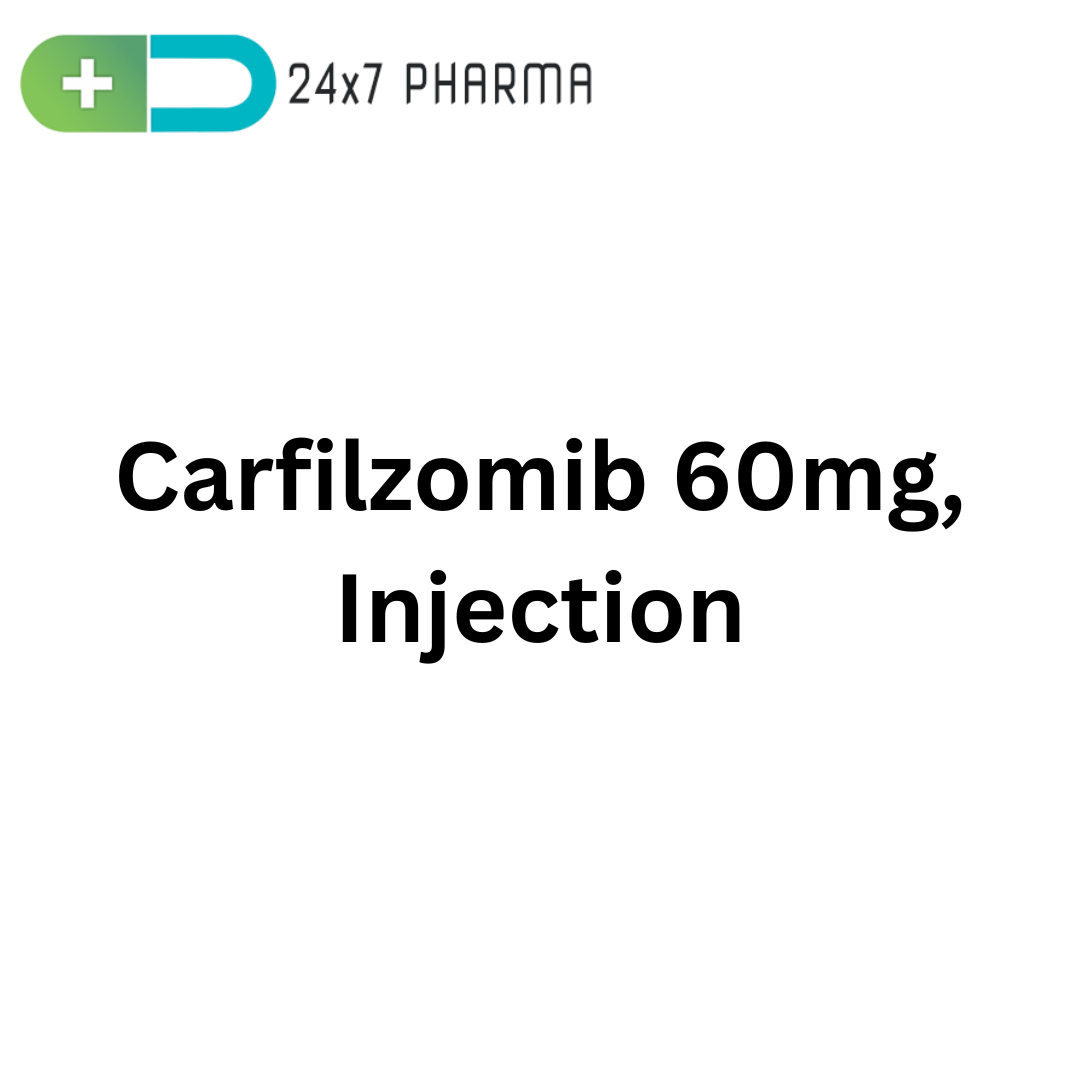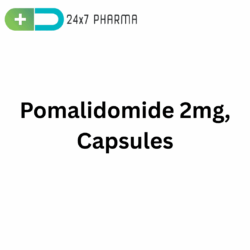Carfilnat 60mg, Carfilzomib Injection
Carfilnat 60mg is a prescription anticancer medicine that contains carfilzomib, a targeted therapy used primarily for treating multiple myeloma, a type of blood cancer affecting plasma cells. Manufactured in India and supplied as a powder for intravenous (IV) infusion, it is designed to slow or stop the growth of cancer cells when other treatments may not have worked or when the disease has returned after initial therapy.
What Is Carfilnat 60mg?
Carfilnat 60mg is the brand name for an injection containing carfilzomib, a second-generation proteasome inhibitor. Proteasomes are protein complexes inside cells that break down unwanted proteins. By blocking these proteasomes, carfilzomib disrupts normal protein recycling in cancer cells, causing stress and cell death.
The product is supplied as a sterile, lyophilized (freeze-dried) powder. Before administration, it is reconstituted with sterile water and given as an intravenous infusion by a healthcare professional.
How It Works / Mechanism of Action
Carfilzomib selectively and irreversibly binds to the 20S proteasome—a key enzyme complex responsible for degrading intracellular proteins. In multiple myeloma cells:
- Proteasome inhibition leads to accumulation of misfolded and damaged proteins.
- This buildup triggers cellular stress responses.
- Cancer cells, which are highly dependent on proteasome activity due to their rapid growth, undergo apoptosis (programmed cell death).
- Normal cells are less dependent on proteasomes and therefore experience less toxicity, giving carfilzomib a targeted advantage.
How to Use / Indications
Carfilnat 60mg is primarily indicated for:
- Relapsed or Refractory Multiple Myeloma (RRMM): Alone or in combination with other agents such as lenalidomide and dexamethasone, or with daratumumab, depending on the patient’s previous treatment history.
- Combination Regimens: It is often combined with dexamethasone or lenalidomide to enhance anti-myeloma effects.
- Its use is limited to hospital or oncology-clinic settings under supervision of a hematologist/oncologist.
How to Take / Dosage
Carfilnat is not a self-administered medication. A qualified healthcare professional prepares and administers the injection as an IV infusion.
Typical adult dosage (may vary based on regimen):
- Starting dose: Often 20 mg/m² body surface area on days 1 and 2 of the first cycle.
- Escalation: If tolerated, increased to 27 mg/m² or up to 56 mg/m² in some combination regimens.
- Schedule: Usually administered on two consecutive days each week for 3 weeks of a 28-day cycle (days 1–2, 8–9, and 15–16), followed by a 12-day rest.
- Infusion time is generally 10–30 minutes depending on the dose and protocol. Pre- and post-hydration with IV fluids is recommended to reduce risk of kidney or infusion-related problems.
Other Dosage Considerations
- Renal or Hepatic Impairment: Dose adjustments or close monitoring may be required.
- Combination Therapy: Doses can differ when combined with other anticancer medicines.
- Missed Dose: If a scheduled dose is missed, the treating physician will decide the best time to administer the next infusion.
- Never attempt to calculate or adjust the dose yourself.
Side Effects
Like all potent anticancer agents, carfilzomib may cause side effects. Not everyone experiences them, but common or serious ones include:
Common
- Fatigue, fever
- Nausea, vomiting, diarrhea or constipation
- Anemia, thrombocytopenia (low platelets), neutropenia
- Shortness of breath or cough
- Muscle or joint pain
- Swelling of hands/feet
Serious (seek immediate medical care)
- Heart-related issues: heart failure, chest pain, high blood pressure
- Kidney problems
- Liver enzyme elevations
- Infusion reactions: fever, chills, breathing difficulty, chest tightness
- Tumor lysis syndrome (rapid breakdown of cancer cells causing metabolic imbalance)
- Blood clots
- Doctors usually monitor blood counts, heart function, and kidney/liver parameters before and during therapy to detect these effects early.
Storage
- Store unopened vials at 2 °C to 8 °C (36 °F to 46 °F) in the original carton to protect from light.
- Do not freeze.
- Reconstituted solution should be used promptly or stored per the manufacturer’s instructions, typically refrigerated and used within 24 hours if not immediately infused.
- Keep out of reach of children.
Benefits
- Targeted Therapy: Specifically attacks proteasomes in cancer cells, limiting collateral damage to healthy tissue.
- High Efficacy: Shown to improve response rates and progression-free survival in relapsed or refractory multiple myeloma.
- Combination Flexibility: Can be combine with several other agents, allowing personalize regimens.
- Rapid Action: Often produces measurable disease control within the first few cycles.
Prescription
- Carfilnat 60mg is a Schedule H prescription medicine (in India) and similar in other countries.
- It is not available over the counter.
- Must be prescribe and administered by an experienced oncologist or hematologist.
- The doctor will base the prescription on prior treatments, kidney and heart function, and overall patient condition.
Interaction
Drug interactions may increase toxicity or reduce effectiveness. Important ones include:
- Other anticancer drugs or immunosuppressants: May amplify side effects such as low blood counts.
- CYP3A inhibitors/inducers: Although carfilzomib is not extensively metabolize by CYP3A, caution is still advise.
- Heart medications or diuretics: Could worsen heart-relate side effects or blood pressure changes.
- Vaccines: Live vaccines should generally be avoide during therapy.
- Always provide a full list of medications, herbal supplements, and vitamins to the treating physician.
FAQs
Is Carfilnat a chemotherapy drug?
It is considere a targeted chemotherapy (proteasome inhibitor) rather than traditional cytotoxic chemotherapy.
Can I take it orally?
No. Carfilnat is only available as an IV infusion.
How long will I need treatment?
Duration varies; many patients receive multiple cycles until disease progression or unacceptable toxicity.
Will my hair fall out?
Significant hair loss is uncommon compare with traditional chemotherapy.
Conclusion
Carfilnat 60mg (Carfilzomib Injection) represents a major advancement in the management of relapsed or refractory multiple myeloma. By irreversibly inhibiting the proteasome, it disrupts the internal machinery cancer cells depend on, leading to their death while sparing many normal cells. Its targeted action, proven efficacy, and adaptability in combination regimens make it a key therapy when earlier treatments fail.
Regular monitoring, adherence to dosing schedules, and prompt reporting of side effects are essential for safe and effective treatment. Always follow your oncologist’s guidance for the best outcome.








